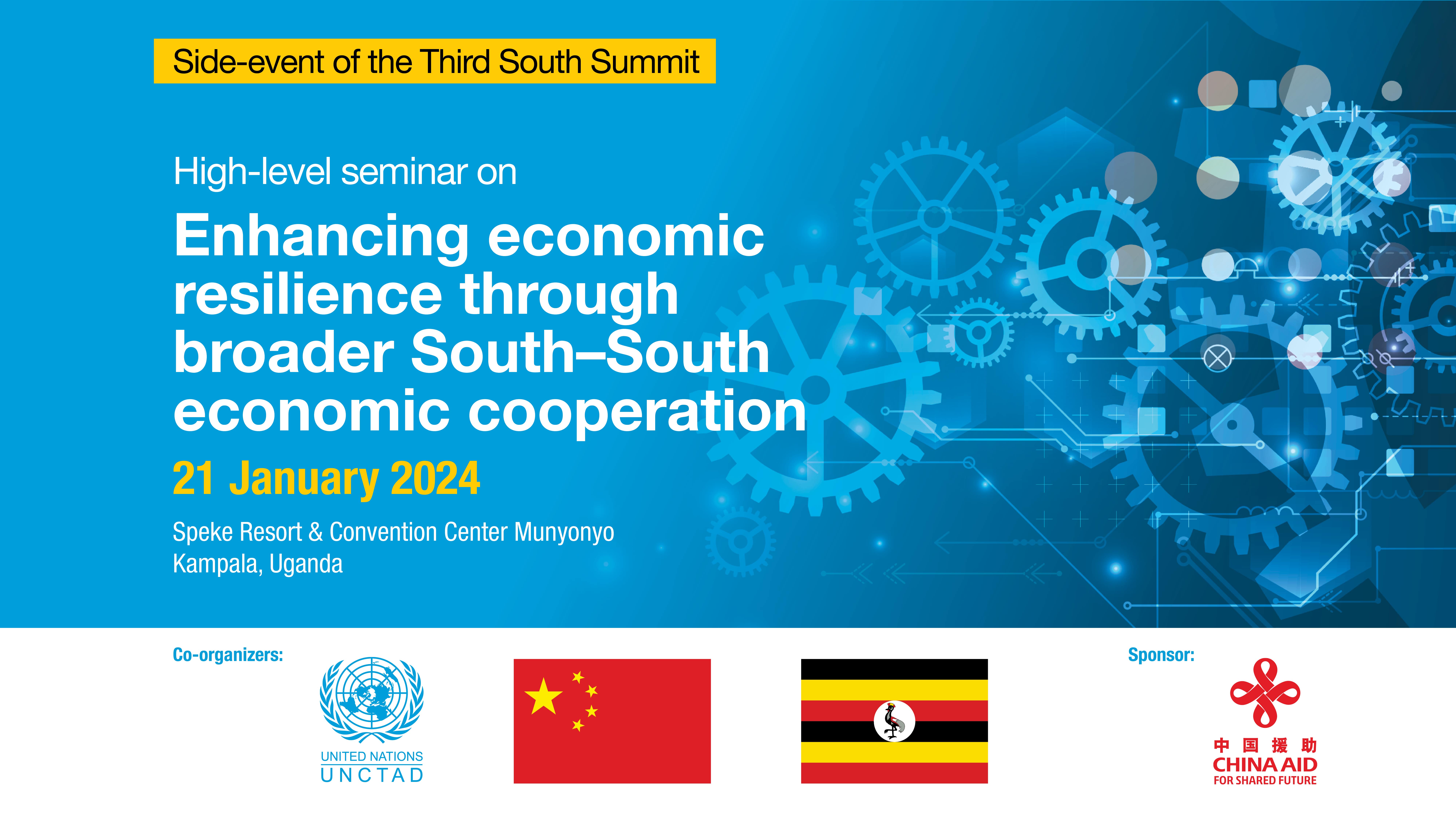Enhancing Economic Resilience through Broader South-South Economic Cooperation
Since 2020, the COVID-19 pandemic and multiple cascading crises that range from the geopolitical tensions and conflicts, financial distress, inflationary pressures, to food and energy insecurity have shocked global economy with lasting impact.
According to UNCTAD estimates, global income would have experienced a cumulative income loss of about USD 13 trillion in 2020-2022. Following a rebound in 2021 the global economy would only revert to its 2017-2019 trend by 2030, on the obviously optimistic assumption of an annual growth rate of 3.5% from 2023 onwards. However, the global growth in 2023 and 2024 is projected to decelerate to 2.4% and 2.5%.
In parallel to increasingly fractured global economy, which is again in a state of flux, climate change is fast becoming one of the most serious global challenges. Research shows that the global mean surface temperature in 2011–2020 was 1.09°C above that in 1850–1900, yet mitigation commitments in nationally determined contributions fall far short of what is required, and will, based on current trajectories, push warming well above the target to limit the temperature increase to 1.5°C above pre-industrial levels.
For the Global South, the cascading crises and climate urgency poses serious challenges to the economy and development. The economic shocks have revealed weaknesses and hindered progress towards the Sustainable Development Goals. For SDG 1 of no poverty, the number of people living in extreme poverty rose to 724 million in 2020, surpassing the pre-pandemic projection by 90 million and reversing approximately three years of progress on poverty reduction.
Under current trends, 575 million people will still be living in extreme poverty in 2030, and only about one third of countries will meet the target to halve national poverty levels. For the climate crisis, developing countries, particularly the Least Developed Countries and Small Island Developing States, have been impacted by climate change more than developed countries due to their greater vulnerability, limited response capacities and lack of adequate financial and technical resources. UN Secretary-General has therefore warned that “unless we act now, the 2030 Agenda will become an epitaph for a world that might have been”.
Economic cooperation and integration among developing countries is increasingly significant for the global actions to advance the SDGs. It has witnessed historical change in the last three decades. The developing region has now accounted for about 40% of global real GDP as of 2022 while the ratio was only 18% in 1993.
The Global South has also played a more important role in terms of trade, finance, investment, technology, and global governance. The South-South trade in goods takes the share of 25% of global total. In 1995, the figure was just 10%. South-South merchandise trade has surpassed South-North trade which means developing countries are now more self-reliant in terms of export market. The emergence of BRICS and its recent expansion indicate a bigger role of the Global South in global economic governance and more concrete South-South initiative such as the New Development Bank can be pushed forward.
However, comparing to the steadily expanded scale, the policy debate focusing on economic cooperation and integration among developing countries remains disproportionately under the radar. For the policy debate on South-South Cooperation, more attention was given to development cooperation which is considered complementary rather than substitute to the ODA.
South-South development cooperation is certainly crucial but only a part of the whole story. In fact, the scale of economic cooperation is way much larger than development cooperation. Just South-South merchandise exports reached over 5.4 and 6.1 trillion USD in 2021 and 2022 while the total ODA, which remains the main channel of the development cooperation and larger than South-South official aid flow, was only 33.3 billion in 2021.
Therefore, strengthening South-South economic cooperation and integration would mobilize significant development finance and economic opportunities for developing countries, which will play meaningful role in assisting them to reach the 2030 Agenda.
How to scale up and diversify South-South trade? How to encourage South-South investment in productive sector? How to encourage South-South industrial and digital cooperation? What is the role of South-South Cooperation in both green transition and structural transformation of developing countries? How to mobilize financial and monetary cooperation among developing countries? Those broader policy issues concerning economic cooperation and integration among developing countries needs to be explored and discussed among policy makers particularly those from the Global South.
Objective
The main objective of this seminar is to convene high-level representatives of the Third South Summit, renowned scholars, head of international organizations and development banks, and business leaders to discuss how to scale up South-South economic cooperation and integration to enhance the resilience of the Global South, given the current global economic and development context.
Questions
-
In view of external shocks and individual growth scenario, what are the key challenges at national level to economic growth of developing countries? Does the developing region share some common binding constraints in building strong and resilient growth in the post-covid age?
-
How to design tailored national policy strategies to enhance economic diversification and resilience? What is the role of South-South cooperation in facilitating the process?
-
What are the trends and the state of play of South-South cooperation in the areas of finance, trade, investment, industrialization and digital transformation, and climate change? How to create an enabling environment to scale up such cooperation? At the international level, how does the Global South can advocate for more inclusive and fairer global economic governance?

